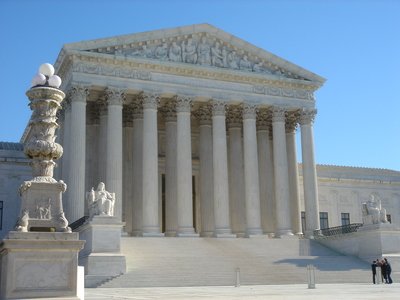
‘It is not our job to protect the people from the consequences of their political choices.’
— Chief Justice of the Supreme Court John Roberts.
WRONG. This is precisely what the Supreme Court’s job is.
The founders of the American republic created three branches of government: the executive, the legislative and the judicial. The legislative branch was created to make laws; the executive branch was created to enforce laws; and the judicial branch was created to interpret them.
To “interpret” a law means to pass judgment on its constitutionality. In other words, to determine whether the premise or content of a law either is consistent with the Constitution, or against it.
If the legislature passed a law, for example, that members of a certain racial, religious or demographic group should be put in concentration camps, the Supreme Court would be entitled — indeed, obliged — to strike down the law as a blatant violation of the Constitution and individual rights. The Court would not say, or should not say, “It’s not our problem. A majority voted for this law, and we cannot protect citizens from the consequences of their political choices.”
In his decision to uphold Obama’s socialized medicine law, Roberts emphasized that his choice to uphold it was not a comment or judgment about the quality of the law itself. Why not? The whole reason the Supreme Court exists is to comment and judge on the quality of laws passed by the legislature!
This ruling is disastrous for the future of medical care. That’s bad enough. But it’s even worse when you consider that the Chief Justice of the United States has abdicated his responsibility for doing precisely what the Supreme Court is supposed to do.
Almost as incredible is the defense of Chief Roberts’ comment by many opponents of Obamacare. They actually think he has a point. Are you kidding me?
Therein lies the error of “judicial conservatives.” They claim that the Supreme Court should not be “activist” or legislate from the bench. Actually, we want the Supreme Court to be activist when it comes to striking down bad law. We want the Supreme Court to judge bad law as bad, and to act accordingly.
If Congress passed a law putting certain people into concentration camps, or if a President used the executive branch to initiate such action on his own, we’d want the Supreme Court to say, “Stop! There are no legal grounds for doing this. We don’t care if Congress voted for it. It completely violates the Constitution.” This might be activism, but it’s good activism — and necessary at that.
There’s no guarantee that any given majority opinion of the Supreme Court will be right. Prior to the abolition of slavery, the Supreme Court upheld slavery. It took a civil war and a constitutional amendment to get rid of slavery. Similarly, the Supreme Court has upheld redistribution of income and other actions of the legislative and executive branch that are nowhere found in the Constitution and — I would argue — should be ruled unconstitutional. However, I can never recall reading or hearing of the Supreme Court withholding judgment, in principle, even as a ruling was passed which affected every individual in the country. That’s, in essence, what John Roberts did. He said, “I’m ruling this way but it’s not my fault. Blame your legislators if you don’t like it.”
A majority already blamed their legislators, in the election of 2010. The election was almost exclusively about Obamacare. The Congress completely changed due to that election. If majority will is more important than the judgment of the Supreme Court, as Roberts implies, then why doesn’t he consider the majority will in that instance? He’s wrong to abdicate his responsibility in favor of majority will; but he’s only considering the majority opinion of the Congress who passed Obamacare, not the majority in any other context. It’s hypocritical and inconsistent even on its own terms.
The implications of what John Roberts has done, both to the Supreme Court and to the Constitution itself, are simply staggering. They’re the judicial equivalent of 9/11, in the damage done. The damage is to medical care, which we’ll all be experiencing for decades to come, but — more than that — to the cause of individual rights themselves. Whether he intended to do so or not, Roberts has given a green light to all future Congresses and Presidents to do whatever they damn well please and the Constitution be damned.
John Roberts is the first nonjudgmental Chief Justice. You know how some people in everyday conversation will claim, “I’m not judging you!” The chief judge of the land has declined to judge. Of course, even when you do that you cannot escape judgment. You cannot NOT make a decision, even when you claim that’s what you’re doing, as John Roberts does. His hands off attitude that, “It’s not for me to judge the constitutionality of Obamacare,” resulted in the actual upholding of Obamacare. At least his socialist comrades on the Court were open about it. Roberts is the worst of them all.
